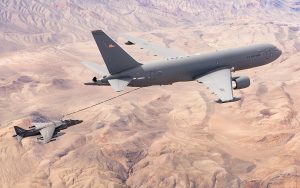EXCLUSIVE Foreign Policy
The Air Force’s effort to buy a new refueling tanker is a long and sordid tale that dates back to 2001.

The U.S. Air Force is expected to announce Thursday that after more than two years of glitches and testing delays, Boeing is finally ready to deliver the next-generation air refueling tanker, bringing to an end a saga that has dragged on for almost two decades, two sources tell Foreign Policy.
Today, Boeing’s tanker, called the KC-46 Pegasus, is one of the Pentagon’s most closely watched programs, drawing fire from top Department of Defense officials and senior lawmakers such as the late Republican Sen. John McCain. Air Force Secretary Heather Wilson last year slammed Boeing for focusing on their commercial business at the expense of the new tanker.
“We have asked them to put their A-team on this to get these problems fixed and get this aircraft to the Air Force,” Wilson told Congress in March 2018.
The situation was further complicated when President Donald Trump abruptly pushed out Secretary of Defense James Mattis on Dec. 31, 2018, leaving Deputy Secretary of Defense Patrick Shanahan, a former Boeing executive, to run the Pentagon in an acting capacity. Shanahan has recused himself from all decisions involving the company.
The first 18 new tankers will cost the Air Force $4.9 billion under a fixed-price contract signed in 2011; as of October 2018, Boeing has eaten $3.5 billion in overrun charges.
The Air Force’s effort to replace its oldest tanker aircraft, the KC-135, is a long and sordid tale that dates back to 2001. Initially, the service intended to use Boeing’s KC-767, a commercial jet refigured for aerial refueling and military transport, to replace the aging KC-135, which first flew in the 1950s and is still operating today. But the Pentagon froze the program in 2003 when a top Air Force official involved in the project, who went on to take a high-paying job with Boeing, was accused of corruption. The official was eventually convicted and jailed; the scandal led to the firing of Boeing’s CFO and CEO, and Boeing ended up paying a $615 million fine.
But the Air Force still needed to replace its oldest tankers. The service began a new program in 2006, and in 2008 it chose a team of Northrop Grumman and European aerospace firm Airbus (then known as EADS) over Boeing to build the new airplane. But Boeing protested the contract award and began a public relations war against Northrop’s tanker. The Government Accountability Office eventually upheld the protest; the Air Force cancelled the contract and opened a new competition in 2009. Northrop declined to submit a bid, and Boeing won the contract in February 2011.
The new KC-46 is meant to be a leap ahead in technology. Among other advances, the tanker is equipped with modern cameras and sensors that allow the operator of the “boom”—an appendage that extends from the back of the tanker to deliver fuel to the receiving airplane—to control it remotely. It is also equipped with state-of-the-art protective systems that allow it to fly in war zones.
But from the start of the development program, there were design and schedule challenges, including on the complex camera system. Boeing planned to deliver the first tanker in the spring of 2016, before a contractually obligated deadline of August 2017, to deliver the first 18 tankers to the Air Force. Boeing missed that deadline, incurring penalties, and the Air Force pushed the deadline to October 2018; the company missed that deadline as well. As of Oct. 24, Boeing had racked up more than $3.5 billion in cost overruns on the program.
Now finally, the Air Force has accepted the KC-46—in other words, deemed it ready for delivery. The first tankers will be based at McConnell Air Force Base in Wichita, Kansas, which will host the formal delivery ceremony as early as late January, according to Air Force spokesperson Capt. Hope Cronin. Japan also plans to buy the KC-46. The Air Force must finish training pilots and operators on the new airplane before it can deploy.
“This is a major milestone for our next generation tanker and will allow our Airmen to begin operational testing and flight training,” Cronin said in a statement announcing the event.
However, Cronin noted that there are still some technical problems left to resolve. Boeing has agreed to fix, at its expense, “deficiencies” discovered during developmental testing of the “remote vision system,” the camera.
“The Air Force has mechanisms in place to ensure Boeing meets its contractual obligations while we continue with initial operational testing and evaluation,” Cronin said.
Pentagon spokesperson Lt. Col. Mike Andrews noted that the department “is in complete agreement” regarding moving forward with delivery.
“The department remains committed to providing the most cost-effective platforms for the U.S. taxpayer, while still delivering the best capabilities to our men and women serving in uniform,” Andrews said.
Update, Jan. 10, 2019: This story was updated to include comment from the Pentagon and the Air Force.





